I've just got round to reading Decca Aitkenhead's interview with Peter Hain in G2. Hain tells her that he doesn't expect Labour to win an outright majority at the next election, but that he thinks the Lib Dems will split and that Labour could form a government with the leftwing Lib Dem faction.
"I think actually that it's going to be very hard for any party to win an outright majority at the next election. Very hard. But I think we can be the biggest party." And form a government with the Lib Dems? "Not with Clegg and co. They stand for just about the opposite of everything we stand for. But I think the Lib Dems are probably going to split. Immediately after the next election. I choose my words carefully, but some very senior people within the Liberal party are extremely unhappy."
So just to clarify, he predicts a hung parliament in 2015, a split in the Lib Dem party, and a government formed by Labour and half of Clegg's old party?
"That's what I think we're fighting for. Yeah. And I think that's a very realistic prospect."
Andrew Neil says on his Twitter feed that he thinks Rupert Murdoch told Alex Salmond when they met recently that he could move BSkyB's HQ to Scotland if Scotland goes independent and Salmond cuts corporation tax.
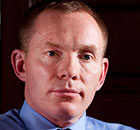 Photograph: David Levene for the Guardian
Photograph: David Levene for the Guardian In his written statement to the Leveson inquiry (pdf), Sir Paul Stephenson, the former Metropolitan police commissioner, said that Kit Malthouse, the deputy mayor of London, repeatedly raised concerns about the amount of money being spent on the phone hacking inquiry. Here's the key quote.
On several occasions after Operation Weeting had started and I had returned from sick leave, the Chair of the MPA [Metropolitan Police Authority], Kit Malthouse, expressed a view that we should not be devoting this level of resources to the phone hacking inquiry as a consequence of a largely political and media- driven "level of hysteria". Whilst understanding his desire to maximise the resources devoted to current issues of crime and public safety, I pointed out that the disclosure requirements arising from the civil cases left us with little choice but to invest significant resources in servicing this matter.
Chris Bryant, the Labour MP, has put out a statement saying that in any other country political intervention of this kind in a police operation would be considered corrupt. Here's his statement in full.
Today's revelation at the Leveson Inquiry by the former Met Commissioner about the actions of Boris Johnson's deputy makes it clear that from the highest political level Johnson and Malthouse have intentionally sought to close down the phone-hacking investigation.
In 2010 Boris Johnson called phone hacking 'a load of codswallop cooked up by the Labour Party' and 'a song and dance about nothing'. Now we discover his deputy, Kit Malthouse, personally intervened with the Police Commissioner to argue for reduced resources for the inquiry and attacked the story as 'hysteria'. This amounts to a clear political intervention designed to intimidate the Met into dropping an investigation. Considering that the investigation has thus far uncovered bribery of police officers by the Sun, mass criminality at the News of the World and a deliberate attempt to pervert the course of justice by News International, both Boris Johnson and Kit Malthouse's interventions show that they are more interested in protecting their cronies than in pursuing justice.
In any other country this kind of political manipulation would be considered wholly unacceptable and corrupt. It is no longer possible for Londoners to have confidence in the Met with Kit Malthouse sitting at the top table. Kit Malthouse should either resign or Boris Johnson should be forced to sack him.
Here's a lunchtime summary.
? Number 10 has confirmed that the government is considering amending its plans to cut child benefit for higher-rate taxpayers. Referring to the way, under the current plans, families will lose all child benefit as soon as one parent starts paying 40% tax, the prime minister's spokesman said: "The prime minister has said in the past that we will look at this issue of the cliff edge, and that is what we're doing." Earlier Nick Clegg also said this problem was being considered. Christopher Chope, a Conservative MP, told the World at One that there was a great deal of opposition to the proposed cut on the Tory backbenches. "This policy was only effectively produced off the back of an envelope at the Conservative Party conference in 2010, as an alternative to a suggestion that child benefit might be taken away from all children over 16," he said. Labour's Chris Leslie told the same programme that the plans were "a total car crash". On her Reality Check blog my colleague Polly Curtis is looking at what the government could actually do to address the "cliff edge" problem.
? Una O'Brien, permanent secretary at the Department of Health, has said that the publication of the NHS's health bill risk register would lead to a "very distorted and very speculative interpretation of risk". She made the comment at the start of a two-day tribunal hearing that will determine whether the government should comply with a Freedom of Information request to publish the register. She also said that publication would lead to the assessments in the register being misunderstood.
The purpose of these registers at this level is really to think the unthinkable. It's really to draw out the range of things that could possibly happen or that might go wrong. We deliberately encourage colleagues to express themselves in relation to these risks in a very forthright way and to be very specific, to grab attention.
? Theresa May, the home secretary, has begun a three-day visit to Jordan in an attempt to break the deadlock over the deportation of the al-Qaida terror suspect Abu Qatada. She said that her talks were "positive".
We and the Jordanian government will continue to work together to progress this case. Jordan has made significant human rights advances, including changes to its constitution. Sadly the Court at Strasbourg failed to recognise this.
Talks today have been positive but we have more work to do in getting the kind of assurances that will allow us to deport Qatada once and for all. This case has gone on for over a decade and I want to bring it to a satisfactory end soon.
? Sir Paul Stephenson, the former Metropolitan police commissioner, has told the Leveson inquiry that he found leaks from his senior officers to journalists "galling".
I am referring to a very small number of the management board who on occasions gossiped and leaked from within the Met and within the management board - that was deeply unhelpful and actually added to a continued dialogue of disharmony and almost dysfunctionality with the Met at the most senior levels. That was hugely distracting and in my opinion unprofessional.
There are more details on our Leveson live blog.
? Lord St John of Fawsley, one of the leading "wets" in Margaret Thatcher's first government and the architect of the modern select committee system, has died at the age of 82. Lord Strathclyde, the leader of the Lords, led the tributes to him.
He was a great parliamentarian and will be missed by all who knew him in both houses of parliament. He was a colourful, deeply spiritual and wise figure whose greatest legacy to the House of Commons remains the select committee, which he created in 1979 as leader of the house.
? David Cameron has accepted that Vladimir Putin won the Russian presidential elections. Asked about allegations that the election was rigged, Number 10 said it delivered a "decisive" result. Douglas Alexander, the shadow foreign secretary, said: "Given the allegations that have already emerged of undemocratic practises, there are real questions to be answered about the election results in Russia. Russian authorities should be in no doubt that the world will be watching their actions closely in the coming hours and days."
? Campaigners have dismissed a Home Office pilot scheme to allow people to find out if a new partner has a history of domestic violence as a waste of money. Here's the Home Office news release explaining the scheme. Sandra Horley, chief executive of the charity Refuge, said: "We are at an absolute loss as to why the government is introducing the new disclosure scheme. It seems to have ignored the concerns of the leading domestic violence organisations and those of Liberty. The new disclosure scheme simply isn't supported by any of us with the expertise to judge its chances of success."
? Clegg has told a group of teenage girls that he finds it shocking that one-third of their peers have reported experiencing some form of sexual violence from a boyfriend. He spoke at the launch of an advertising campaign designed to make teenagers more aware of the seriousness of sexual abuse.
What this ad campaign is seeking to achieve is to send an incredibly strong message to teenagers, and particularly to teenage boys, that, if you have sex with a girl who doesn't want to and doesn't consent, you're committing rape - it's a crime. When a girl says 'no', no means no, means no. There's no ifs and buts.When you've got a situation where a third of teenage girls say they have been subject to sexual coercion and abuse, when lots of teenagers say in surveys that they think it's OK for a boy to expect to have sex with a girl they spend time with, something's going wrong and we need to challenge it, and this is a very hard-hitting advertisement which challenges all of that.
? The Equality and Human Rights Commission has said that some public bodies are not doing enough to protect human rights. It made the claim in a human rights review, published as part of its 'How Fair is Britain?' series. According to the Press Association, it says the human rights of terrorist suspects, illegal immigrants and travellers should all be given better protection.
? New research has shown that faith schools take a disproportionate number of better-off pupils.
Lord St John of Fawsley, who, as Norman St John-Stevas served as a cabinet minister in Margaret Thatcher's government before being sacked with other "wets", has died.
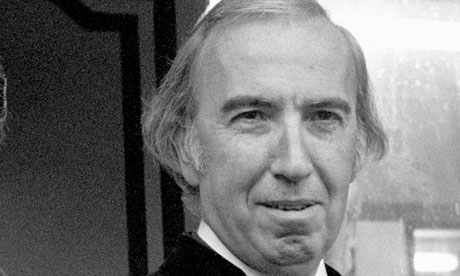 The then Norman St John-Stevas in 1980. Photograph: PA
The then Norman St John-Stevas in 1980. Photograph: PA The Press Association is now running an obituary written by Chris Moncrieff. Here's an extract.
Lord St John of Fawsley, urbane, elegant, witty and foppish, was a powerful and passionate pundit for the arts, the deadly enemy of the Philistine, and a profound authority on the constitution.
He was a flamboyant dresser whose life was a carnival of grandiloquent flourishes. He was once genuinely upset when he graced an occasion sporting a red cloak only to find he had been "upstaged" by someone wearing a purple one.
Norman Antony Francis St John-Stevas, as he was before becoming a life peer in 1987, was Leader of the House of Commons and minister for the arts before being sacked by Margaret Thatcher in 1981.
His dismissal may well have been related to his less than fulsome respect for the woman he cheekily nicknamed "the Leaderene" and "the Blessed Margaret". Not content with that, he was the reported author of her other soubriquet, "Tina" - an acronym for "There is no alternative".
Lord St John was no respecter, either, of media presenters. He once outraged Jimmy Young by breaking off a live radio interview to answer a knock on his front door.
"It's the man from Harrods come to fix my new curtains," he explained to a fascinated audience. "If he thinks I am out he won't come back."
He was vain and narcissistic, but a likeable prima donna, nevertheless. He used to cox a (not the) Cambridge crew wearing a topper, white tie and tails. His manners were exquisite and his etiquette was precise down to the last velvet glove.
But Lord St John was bothered that his extrovert and dandified approach would deter people from taking him seriously.
"Because I am burdened with a capacity for wit, people have sometimes had the impression that I am not serious in my approach," he once lamented. "Nothing could be farther from the truth."
He did not go sulking in his tent when Mrs Thatcher dismissed him from office. He took up numerous tasks, related to the arts, including chairman of the Royal Fine Art Commission, and chairman of the judges for the Booker Prize as well as the massive editing of the works of Walter Bagehot, the constitutionalist.
The deposed minister retired briefly to his country house in Northamptonshire and said: "I wrote down my feelings and what was to be learned." He put the list in a cupboard and never looked at it again.
"You really have lost the battle if you become embittered. I was determined not to be," he stressed.
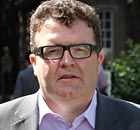 Photograph: Peter Macdiarmid/Getty Images
Photograph: Peter Macdiarmid/Getty Images Downing Street told us this morning (see 11.42am) that there were no plans to investigate claims that Andy Coulson misled the media in 2010 by saying that Cameron had not been riding with the husband of Rebekah Brooks. Maybe Tom Watson (pictured), Labour's deputy chair, will have more luck securing an investigation. He has written to David Cameron this morning about the story. Here's an extract.
What steps are you taking to establish whether the reports are true? You are on record as saying that, whilst working for you, Mr Coulson did "an excellent job in a proper, upright way at all times." If the investigation finds this claim is inaccurate, what steps are you taking to ensure that other potential incidents of wrongdoing are investigated?If these reports are true it would be a sign of, at worst, a culture of dishonesty developing in Downing Street or, at best, a failure by yourself to ensure the highest standards of integrity are maintained by your staff. In either case, how do you propose to address this?
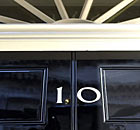 Photograph: Andy Rain/EPA
Photograph: Andy Rain/EPA Here's a summary of the Number 10 lobby briefing.
? David Cameron is not disputing Vladimir Putin's election as Russian president and is likely to be speaking to him later this afternoon. The prime minister's spokesman said that although there were concerns about "unequal campaign conditions" ahead of the election, "it is clear that the election has delivered a decisive result". Asked if Cameron welcomed Putin's election, the spokesman replied:
We have a constructive relationship with Russia. We want that continue. That relationship allows us to advance our national interest. Clearly there are issues where we do not agree. We made that clear when we visited Russia. But that should not prevent us working together on those issues where there is a common interest.
? Downing Steet rejected the claim from Cardinal Keith O'Brien, Britain's most senior Catholic, that churches could be forced to accept gay marriage as a result of the government's plan to allow civil gay marriage. (See 9.04am.) "We believe that people should have the option of civil marriage irrespective of sexual orientation," the spokesman said. "These proposals cover civil marriage, not religious marriage," he went on. "There is no questions of churches or other religious institutions being forced to [accept gay marriage] if they do not want to." The government expected to legislate for this before 2015, he said. He refused to say whether MPs would get a free vote, saying it was too early to discuss whipping arrangements.
? Number 10 confirmed that the government is looking at ways of softening the impact of the withdrawal of child benefit from higher-rate tax payers. "The prime minister has said that we will look at the issue of the cliff edge," the spokesman said, referring to the way abrupt cut-off that (under the current plans) will lead to families losing all child benefit if one parents pays higher-rate tax. The spokesman said there would have to be a Commons vote before the scheme came into force in January 2013 and he hinted that the issue would be addressed in the budget.
? Downing Street suggested that the government was opposed to a European Commission plan (see 10.49am) to introduce quotas for women in the boardroom. "Our view is that it is better for companies themselves to take the initiative," said the spokesman.
? Number 10 refused to confirm a report in the Sunday Times saying Cameron has firmly decided to introduce a minimum price for alcohol. But the spokesman would not deny the report either. He said the government would set out its plans when it published its alcohol strategy.
? Downing Street said there were no plans to investigate claims that Andy Coulson misled reporters about Cameron going riding with Rebekah Brooks' husband, Charlie Brooks, when Coulson was working as Cameron's communications director. Coulson told the Mail on Sunday in late 2010 that Cameron has not gone riding with Charlie Brooks, but last week it emerged that he had.
? Downing Street confirmed that Theresa May, the home secretary, is now in Jordan, where she is trying to secure assurances that could lead to Abu Qatada being deported there.
? Number 10 dismissed suggestions that David Cameron's decision not to meet Francois Hollande, the socialist candidate for French president, when he visited London last week was because taken because Cameron had agreed an anti-Hollande pact with other conservative EU leaders. This allegation has been made by the Germany magazine Der Spiegel. Cameron's spokesman said the prime minister did not meet Hollande because "as a general rule we do not meet candidates in foreign elections".
Thin pickings at the lobby this morning. I'll post a summary shortly.
You can read all today's Guardian politics stories here. And all the politics stories filed yesterday, including some in today's paper, are here.
As for the rest of the papers, I've already mentioned child benefit. (See 9.00am.) Here are some other stories and articles that are particularly interesting.
? Stanley Pignal and Charlotte Clarke in the Financial Times say the European Commission is pressing ahead with plans for quotas to increase the number of women on company boards.
Viviane Reding, justice commissioner, will on Monday announce the first step towards European-level legislation, a year after she threatened mandatory measures if no progress was made on improving gender balance at the higher echelons of business.
EU figures show only 13.7 per cent of board members at large listed companies are women, well below the 40 per cent threshold targeted by Brussels. Many southern European countries have far lower rates ? Italy and Portugal stand at 6 per cent ? in contrast to Scandinavia where one quarter of top business leaders are typically female.
A three-month public consultation will seek views on the proposed level of quotas, which companies would be affected, when the measures would come into force and sanctions for those who fail to meet them. An EU-wide quota would propel the bloc past the US, whose companies have 16 per cent women on their boards. In Asia, female participation is the exception rather than norm, often the result of family ties. Only one in 20 board members in India and China are women. In Japan, the figure is just 1 per cent.
? Peter Riddell, director of the Institute for Goverment, says in the Daily Telegraph that the institute has published proposals to reform the civil service.
What might success look like? The Civil Service would be smaller but clearer about its core functions ? no longer the exclusive or even predominant provider of policy advice or manager of projects, but a co-ordinator to ensure decisions are made and implemented on the basis of the best possible information. It would be better at financial management, commercial skills, and developing its staff. Also, senior civil servants would be more personally accountable both within Whitehall and to Parliament.
An immediate test is provided by the programme of spending reductions, which will last well into the next parliament. Most departments, apart from Health and International Development, face cutbacks of nearly a fifth by the next election. The danger is that cuts are achieved through big and blunt cost-cutting measures. That is easier than a more systematic look at what functions should be run differently or hived off. The next spending review is likely to be in 2013, so it would be better to start looking now at cross-departmental saving: how programmes should be run differently, how departments can work together and save costs. The result would be a smaller but more sustainable government.
? Christopher Hope in the Daily Telegraph says the Centre for Policy Studies has published a report saying that a mansion tax would lead to tax revenue being lost.
[The] study published today suggests the measure would "unfairly target the income poor, equity rich" who had lived in their homes for decades. It would also be "both difficult and expensive to value all relevant properties".
It said that a third of London homes worth more than ?2million have been owned by the same family for over 10 years.
The report says that the measure "would undermine London's position as one of the world's leading business locations". It adds that the tax revenues it would lose because it would stop rich people setting up home in the UK would outweigh the benefits.
? Andrew Gregory in the Daily Mirror profiles Sir Jeremy Heywood, the new cabinet secretary.
I'm off to the Number 10 lobby briefing now. I'll post again after 11.30am.
Sir Paul Stephenson, the former Metropolitan police commissioner, is giving evidence to the Leveson inquiry now. You can follow the proceedings on our Leveson live blog.
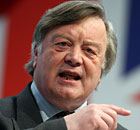 Photograph: David Jones/PA
Photograph: David Jones/PA The legal aid bill is back in the Lords today. Lord Bach, a Labour justice spokesman, has written an article for PoliticsHome saying that the government should be cutting criminal legal aid, not civil legal aid.
When I was legal aid minister, we had to take a really tough look at legal aid, especially towards the end of the last Parliament. Criminal legal aid has, for years, been chewing up a growing proportion of the Legal Aid budget. Nearly ?1.2bn was being spent just on that area. In comparison, social welfare Legal Aid costs less than ?200m. The government has left criminal legal aid alone. And yet he has absolutely slashed social welfare legal aid to the bone.
At the end of the last Parliament Jack Straw and I put together plans to restructure the delivery of criminal Legal Aid by changing our tendering processes. It would have been controversial. But I believed then and believe now that there is fat in the criminal legal aid budget ? especially when it comes to very high cost cases which consume 49% of the budget while representing only 1% of cases ? to be cut.
But there isn't in social welfare legal aid. Advice on debt, housing law, welfare benefits is delivered by lawyers in advice centres on extremely modest salaries. Not only are these lawyers paid modestly, but their core expertise in these areas of law allows them to direct the work of volunteers and help pro bono lawyers ? who have legal knowhow but may not know the statutes and regulations on a particular area of social welfare law ? to do their jobs. It's immensely good value for money. And if you try to cut too far and too fast you threaten to collapse this delicate ecosystem of some of the most worthy members of our communities.
But on the Today programme Kenneth Clarke (pictured), the justice secretary, claimed that no one would lose access to justice under his plans, which will promote more use of mediation.
It doesn't close anybody's access to justice, at all. For those who don't get legal aid, the courts are already too expensive, so they're normally only accessible to the very rich or the very poor but access to justice will still be there.
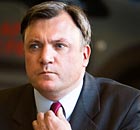 Photograph: Murdo MacLeod
Photograph: Murdo MacLeod In his controversial Fabian Society speech in January, Ed Balls (left) said that if Labour won the election in 2015, it would start from the assumption that it would have to accept all the government's cuts. But he did not sound minded to accept the child benefit cut when he was talking about it on ITV's Daybreak this morning. This is what he said.
What's particularly unfair though is that it was so damaging the way this was being done. On child benefit what the government was saying is that if you were a two earner family earning ?84,000 - ?42,000 each - you keep your child benefit but a one earner family where the mum or dad stays at home to look after the kids on ?43,000 would lose it entirely. That is a huge hit to income.
The Labour motion on living standards being debated in the Commons this evening says the child benefit cut will cost a higher-earner with three children ?2,450 a year.
In his interview Balls also highlighted the fact that tax credit cuts will cost up to 200,000 low-income families nearly ?4,000 a year from April.
Since I know how fond some of the readers of this blog are of Nick Clegg, I thought I would share with you the news that a former Lib Dem MP is saying today that Clegg should resign before the election.
There's no point in pulling our punches. After a year of research, [we] have concluded that Nick cannot realistically lead the party into the next election without incurring an additional contraction in the number of MPs - directly as a result of his leadership. We have also identified the lack of a political narrrative which was left the party drifting in an identity vacuum while, by contrast, the Conservatives have been remarkably effective at maintaining their focus and image.
The good news for Clegg is that the former MP is Lembit Opik, who is publishing a book, The Alternative View, that he has written with Ed Joyce. Opik's credibility as a political figure has shrunk to zilch in recent years because of his cringe-inducing publicity seeking (although, of course, that doesn't mean that he's wrong about everything).
Yesterday Cardinal Keith O'Brien, president of the Bishops' Conference of Scotland and Britain's most senior Catholic, had an article in the Sunday Telegraph saying that the government's plan to allow gay marriage was "madness". He was on the Today programme this morning making his case again. He said David Cameron's proposal was "shaming" for Britain. I've taken the quote from PoliticsHome.
If the United Kingdom does go for and support same sex marriage it is indeed shaming the country. We're taking standards which are not just our own but taking standards from the UN Declaration on Human Rights, where marriage is defined as a relationship between men and women, and turning that on its head and saying 'marriage is no longer marriage'. We're trying to redefine something which has been known for centuries and making it something it is not.
I would say that countries where this is legal are indeed violating human rights. We know what the United Nations declaration states and we know what follows on from something like this. It seems to me to be the thin edge of the wedge and it redefines what a family is. I think it affects children who are born. Children have the right to have a mother and a father.
Child benefit is back in the news this morning. Inspired probably by James Forsyth's column in the Mail on Sunday yesterday, the Daily Telegraph is splashing on a story saying George Osborne is preparing to water down his plans to take child benefit away from higher-rate tax payers. Nick Clegg has now given the story fresh legs by telling the BBC this morning that the government is looking at the possibility of amending its plans.
We all accept that what you do when you create these cut-offs is you create some sort of bigger anomalies where one family with one earner doesn't get child benefit, and one with two earners who earn slightly less but together more [does get child benefit], and that's the kind of thing that we've always said we're prepared to look at.
Clegg was giving an interview because he is publicising a campaign to make teenagers more aware of the nature of sexual abuse and his comments about child benefit are no more than what ministers have said before. But the BBC have picked up on them, partly because Labour are doing their best to get this issue onto the agenda by holding a debate on living standards later this evening.
I'll be covering any further developments throughout the day, but there are plenty of other stories on the go. Here's the full agenda.
9.30am: The Home Office is announcing details of a pilot scheme that will allow people to find out if their partner has a history of domestic violence.
10am: Sir Paul Stephenson, the former commissioner of the Metropolitan police, Elizabeth Filkin, who caried out a review into relations between the Met and the media, and Roger Baker from Her Majesty's Inspectorate of Constabulary give evidence to the Leveson inquiry.
10am: The Information Tribunal begins a two-day hearing into whether the government should have to publish the NHS risk register.
11am: Diane Abbott, the shadow minister for public health, gives a speech to the IPPR thinktank.
11.30am: David Cameron visits a Tesco store to welcome its announcement that it will create 20,000 jobs over the next two years.
2.30pm: Eric Pickles, the communities secretary, gives a speech on funding local infrastructure.
Around 3pm: Peers debate the legal aid bill.
3.30pm: David Cameron makes a statement in the Commons on last week's EU summit.
As usual, I'll be covering all the breaking political news, as well as looking at the papers and bringing you the best politics from the web. I'll post a lunchtime summary at around 1pm and another in the afternoon.
If you want to follow me on Twitter, I'm on @AndrewSparrow.
And if you're a hardcore fan, you can follow @gdnpoliticslive. It's an automated feed that tweets the start of every new post that I put on the blog.
Source: http://www.guardian.co.uk/politics/blog/2012/mar/05/cameron-clegg-child-benefit-budget
weather channel road conditions newt gingrich wives weather gina carano at last al green
No comments:
Post a Comment
Note: Only a member of this blog may post a comment.